2025 VW ID.7 First Drive Review: Another electric sedan in a sea of SUVs

MANE, France – Volkswagen’s flagships have historically come in many different shapes and sizes.
In the early 1960s, the brand experimented with a big, boxy sedan powered by a rear-mounted flat-six engine closely related to the unit that powered the original Porsche 911. Known as the EA 128 internally, the model remained at the prototype stage but set a ball rolling that the stately Phaeton caught in 2002. The second-generation Phaeton was developed, tested, and ultimately canned. Volkswagen returned to the drawing board armed with a modular platform designed for electric cars to create a new flagship.
Unveiled earlier in 2023, the 2025 Volkswagen ID.7 isn’t a flagship in the Phaeton sense of the term. Its mission isn’t to ruffle BMW- and Mercedes-colored feathers; that’s still Audi’s job. It’s a Volkswagen flagship rather than a flagship Volkswagen. Coincidentally, it’s also the Wolfsburg-based company’s first electric sedan.
Adding a sedan to the range of ID-branded EVs unlocks two key advantages. First, customers in global markets now have a battery-powered alternative to the Passat (which recently went wagon-only in Europe) and, to some extent, the Arteon. Second, compared to a crossover, a sedan normally weighs less and has a lower drag coefficient, so it delivers more driving range. Engineers put a big focus on extending the time between charging stops during the development process. The ID.7 consequently boasts a drag coefficient of 0.23, a figure that places it between the BMW i4 (0.24) and the Porsche Taycan (0.22).
Visually, the ID.7 falls in line with existing members of Volkswagen’s EV line-up but it’s not a Xerox copy of, say, the ID.4. It’s also not retro like the ID.Buzz; it’s its own thing. It’s characterized by sharp-looking headlights linked by a light bar, a distinctive arch-shaped roof line with a strip of gray trim, and a rear light bar. It’s not quite a scaled-down Audi A7, but it’s more interesting looking than the last Passat.
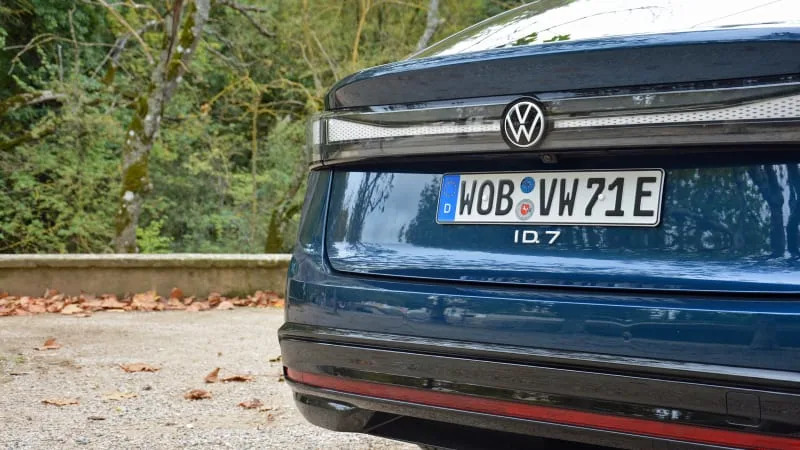
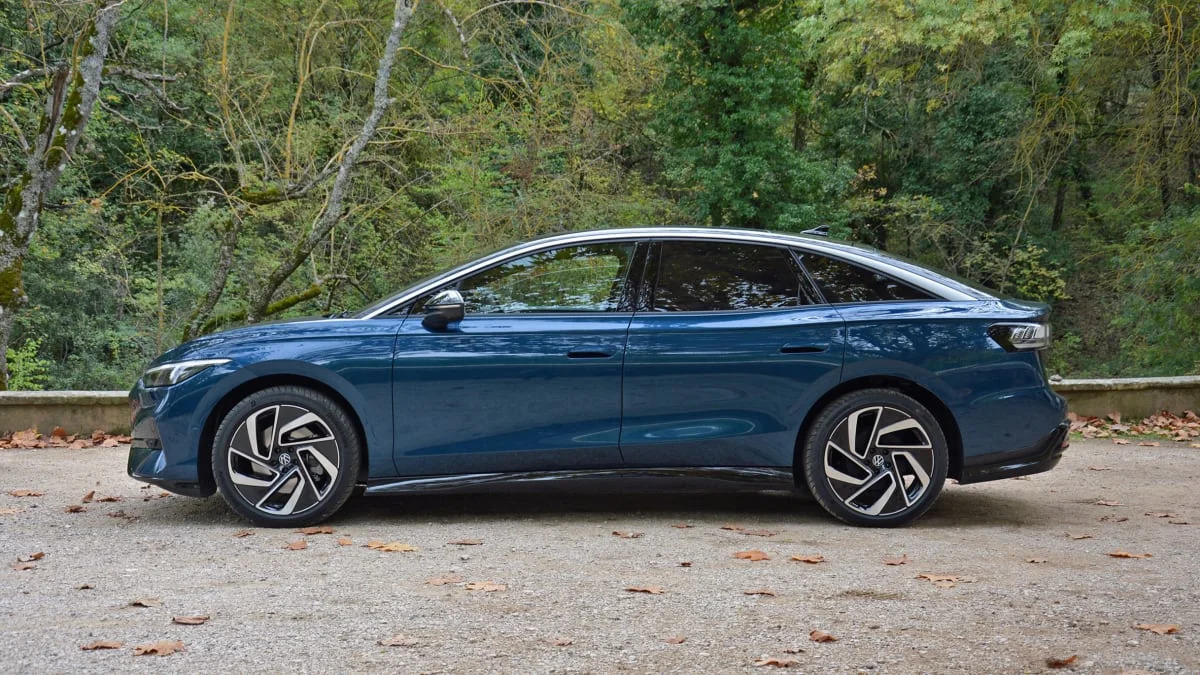
One detail that you may not fully grasp until you see the ID.7 on the road is its size. It’s not a small car. It measures 195.3 inches long, 73.3 inches wide and 60.5 inches tall. It’s bigger in every direction than the now-retired American-market Passat, itself a very large sedan, and it’s about the same size as the new Mercedes-Benz E-Class. As with other EVs, the wheelbase stretches further than those ICE-powered sedans of similar overall length – it’s actually an inch longer than a last-generation Chevy Tahoe.
Stretching the wheelbase to SUV-like proportions gives the ID.7 an interior that’s more spacious than you might assume, even taking into account its not-so-nimble exterior dimensions. There’s plenty of space in every direction, regardless of whether you’re sitting in the front or in the back, and you can carry 18.8 cubic feet of stuff in the large trunk accessed through a massive hatch. That’s a greater volume than in the Passat. Folding down the rear bench yields 56 cubes. There isn’t a frunk, but then relatively few EVs actually have a useful frunk at this point.
Sandwiched within that wheelbase is the lone battery choice: an 82-kilowatt-hour lithium-ion pack. The range number for the U.S. market won’t be published until closer to the ID.7’s on-sale date, but the European figure checks in at 386 miles. Ours will be lower, as European numbers lean toward the optimistic side of the scale. Volkswagen claims zapping the battery pack with about 127 miles of range takes roughly 10 minutes at a 175-kilowatt charging station, though I wasn’t able to put this claim to the test.
Underpinning the ID.7 is the same MEB platform that underpins other ID Volkswagens, albeit with a new, oil-and water-cooled electric motor called AP550 that’s rated at 282 horsepower and 402 pound-feet of torque. These figures make it the most powerful motor in the Volkswagen arsenal. Rear-mounted, it spins the rear wheels via a one-speed transmission, delivers a zero-to-62-mph time of about 6.5 seconds, and unlocks a top speed of 112 mph. An all-wheel-drive variant with two electric motors will be available when the ID.7 goes on sale in 2024 (likely as a 2025 model). We might also see a 91-kilowatt-hour battery pack added sooner or later.
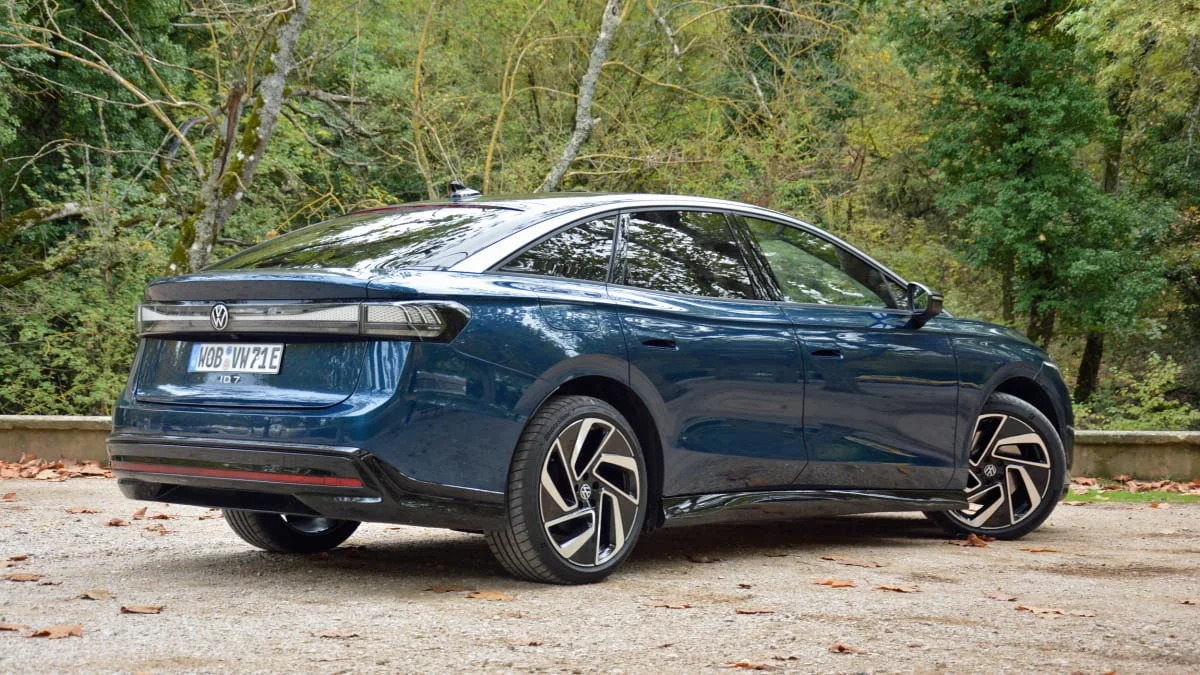
Driving the ID.7 in the south of France, on a varied assortment of roads including some that I take on a regular basis, confirmed my initial impressions: there’s no need for a Sport drive mode. It’s there, and it does make the throttle response sharper, but this is not a car that wants to be hustled. There’s a Jetta GLI for that. No, the ID.7’s best attribute is comfort. Like pretty much every electric car, it delivers quick, linear acceleration off the line, and even at highway speeds it’s reasonably quiet – there’s not a lot of wind noise, which is partially due to the low drag coefficient discussed earlier. The seats are comfortable and supportive, and there’s one hell of a sound system; you may as well be traveling in your living room.
Surprisingly, Volkswagen achieved this ride using a standard steel suspension system. There’s a strut-type setup in the front and a five-link layout in the back. While you won’t find air springs, you’ll find a great deal of hardware and software filtering out road imperfections. Volkswagen notably redesigned its adaptive damping technology (DCC) with a new controller, and the system continuously adjusts the damping force on each wheel to give the ID.7 a smooth ride. This big sedan is happy to glide along for miles on end.
That’s not to say the ID.7 can’t take a corner. It tips the scale at 4,788 pounds, so it’s not light, but the battery is the heaviest part of the car by a long shot and it’s mounted directly under the cabin, where it lowers the center of gravity and evens out the weight distribution. This packaging gives the ID.7 relatively flat cornering at the expense of the rear-biased handling you’d expect given the drivetrain configuration.
Volkswagen dialed in a brake energy recuperation function but it’s either on or off; you can’t choose from different levels of regeneration like in some electric cars. Off, with the gear selector set to the “D” mode, the ID.7 coasts when you lift your foot off the throttle. On, with the gear selector set to the “B” mode, it slows down faster than a comparable gasoline-powered car when you lift off the accelerator. One-pedal driving is possible if you’re not driving aggressively, and I learned that regen is the reason why the ID.7 can utilize old-school rear drum brakes, but the ability to dial in different regen levels (even just “low” and “high”) would still be appreciated. Regen also gives the ID.7 the slightly odd and almost video game controller-like brake pedal feel you find in many plug-in hybrid and electric cars.
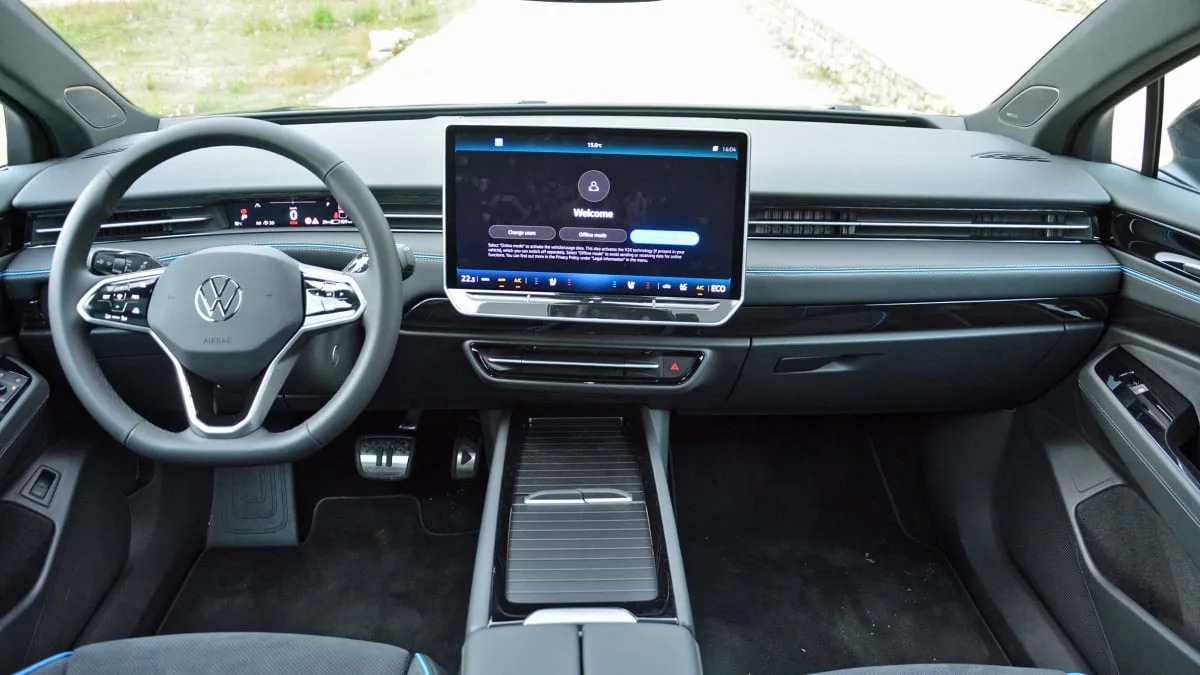
Standard on the American-market model, the head-up display offers an augmented reality (AR) function that builds on the basic set of information you normally find in these systems with interactive navigation directions. This isn’t new, BMW offers a similar technology on many of its cars (such as the iX), but keep in mind we’re talking about a Volkswagen. This is how the brand defines “flagship” this time around: upmarket features and comfort in a more attainable package. Better yet, the head-up display works stunningly well. It shows data such as the current speed and the speed limit relatively close to the driver and displays navigation directions a little further away. It’s intuitive and easy to use, to the point where I hardly looked at the instrument cluster (a small digital rectangle) during my time behind the wheel.
The smart air vents, which are controlled via a menu in the infotainment system’s 15-inch touchscreen, are not as intuitive and easy to use. On one hand, I get the “new tech” aspect – I can already hear future ID.7 owners asking a neighbor “can your [insert make and model] do this?!” On the other hand, it’s tech for tech’s sake, and I’ve never thought “damn, I wish these air vents were electronic” while driving. Your mileage may vary, but Porsche has already moved away from similar screen-controlled airvents after trying them out in the Panamera and meeting customer distaste. It’s hard to see Volkswagen owners feeling differently.
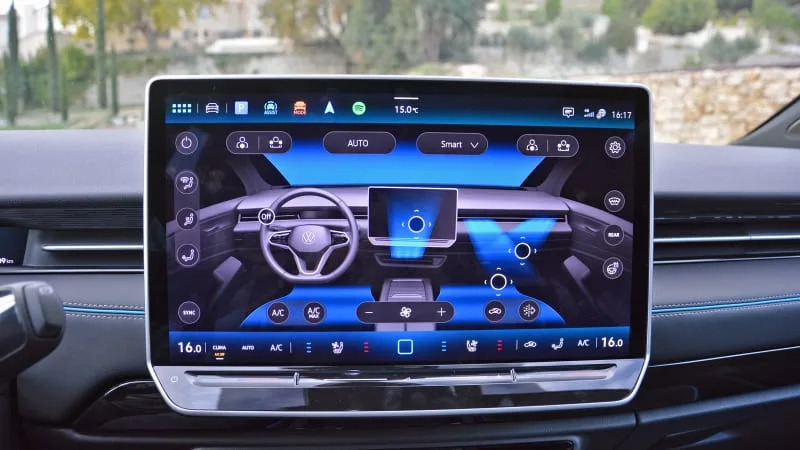
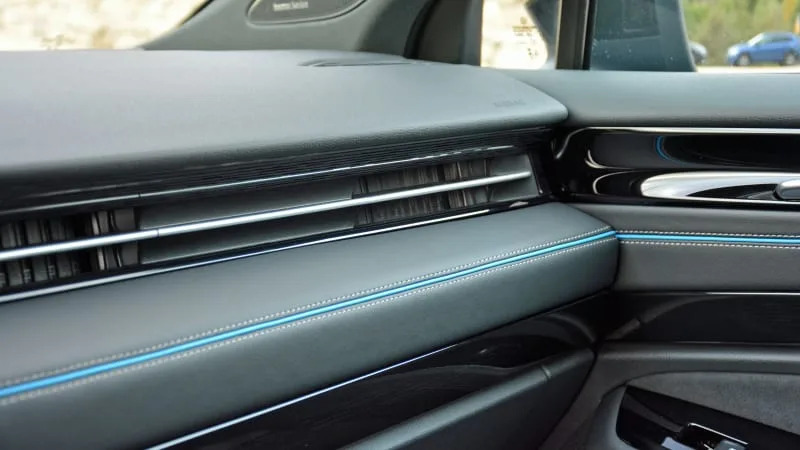
Beyond the air vents, the ID.7’s new infotainment system represents a massive step forward compared to the software found in the ID.4 and GTI. Its home screen features tiles that correspond to a menu, allowing it to simultaneously display navigation, music and battery state of charge. It’s fairly straight-forward to use, but the touch-operated sliders for volume and temperature remain. Even if they’re now illuminated, they’re still inferior to physical controls more easily found without looking. It might be too late to #savethemanuals (although, there’s an uptick in the take rate!) but is it too late to #savetheknobs?
With a usable amount of range, a comfortable interior, and a large serving of technology, the ID.7 makes a good case for itself as Volkswagen’s flagship. Paradoxically, it will land as a rational choice in the electric segment: there aren’t many battery-powered sedans on the market, and most come from luxury brands.
Volkswagen dealers across the nation will begin receiving the ID.7 during the second half of 2024. Buyers will initially have two trim levels called Pro and Pro S, respectively, to choose from. Pricing hasn’t been announced yet, but it’s reasonable to assume the cheapest variant will start at approximately $50,000 excluding incentives. That will make it the brand’s most expensive model on our shores. Flagship, indeed.







